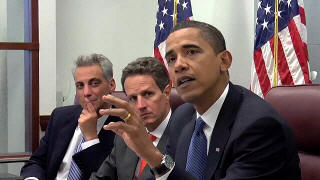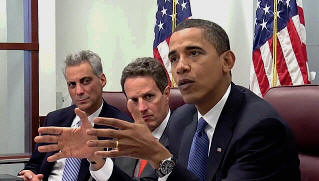All right. Well, thanks for taking the time to come in for a moment. You know, this is the core of my economic team, and the message of our meeting today is one that comes as no surprise to most Americans, and that is we are in a very difficult spot. The economy is bad. The situation is getting worse.
Last week, we learned that manufacturing had hit a 20-year low. On Friday, we're going to get the final jobs report from this year, and every indication is that we will have lost in 2008 more jobs than at any time since World War II.
It's clear that we have to act and we have to act now to address this crisis and break the momentum of the recession or the next few years could be dramatically worse. That's the message that I delivered to Speaker Pelosi this morning. I will be meeting with Harry Reid and with the bipartisan leadership group this afternoon.
And the most important message today is that the situation is getting worse, we've got to act boldly, and we've got to act swiftly. We cannot delay.
I said in my Web address this past Saturday, this is not a Republican problem or a Democratic problem at this stage. This is an American problem, and we're all going to have to chip in and do the hard work that's required and what the American people expect of us.
Over the last few weeks, our economic crisis has only grown deeper. Two million Americans have now lost their jobs over the last year. We have a substantial number -- in fact, Christina Romer, our economist from the Council of Economic Advisers, indicates to me that in addition to the 2 million who've lost jobs, you've got 2.8 million who have moved from full-time work to part-time work.
So when you start counting in people who are underemployed, then the situation is very dire for American families.
Again, manufacturing's hit a 28-year low.
Across America, millions of Americans are struggling with rising costs, growing debts, concerns about home foreclosure, a deepening sense of unease.
When I last met with my team, I asked them to continue their work on an American recovery and reinvestment plan that would not only create jobs in the short term, but also spur economic growth and lay the foundation for a sustained competitiveness in this global economy over the long term.
During today's meeting, I learned about the substantial progress that they've made in developing that plan. And we are beginning to share details of that plan with leadership on the Hill. And we will be rolling this out to the American people, assuring that there is clarity and transparency about the entire process.
One of the things that I've emphasized to my team -- and one of the things that I've emphasized to congressional leadership and will emphasize again today -- is that not only do we have to act boldly, swiftly and with a sufficient magnitude to make a difference, but we've also got to do things in a new way.
It's not going to be sufficient for us just to fall back into the old Washington ways and simply throw money at the problem. We need to demand vigorous oversight; we need to have strict accountability in terms of how the -- the recovery and reinvestment plan operates.
The American people have a right to know how every dime of their money is spent, and that is going to be built into the plan, so that everybody understands what is being done in order to address this crisis.
We also in this group talked today about the financial system that is still precarious. We have not seen the credit markets recover the way we would have liked to see them recover, despite the efforts of Treasury and of the Fed, the many unprecedented steps that have been taken.
And so part of this team's task is to shape the next phase of economic recovery so that it is more transparent, so that it is more consistent, so that the public and the markets and businesses all understand exactly how it is working, what our expectations are and what will be accomplished as a consequence of some of the extraordinary steps that have been taken.
Finally, we talked today about the tough choices that we're going to have to make to restore fiscal responsibility, so as the economy recovers, our deficit can start to be brought down. As I said earlier, right now, the most important task for us is to stabilize the patient. The economy is badly damaged; it is very sick. And so we have to take whatever is -- steps are required to make sure that it is stabilized.
But we also have to recognize that if we're going to grow this economy over the long term, if we're going to create a better future for our children and our grandchildren, then we can't be fiscally irresponsible about how we do it.
And so -- we have been in deep conversations and will continue over the next several weeks to shape our recovery and reinvestment package alongside very concrete, serious plans for midterm and long- term fiscal discipline. And that is something that we will be also be presenting to the American people as well as leadership on Capitol Hill.
So I'm looking forward to meeting with both the Democrats and Republicans this afternoon. My expectation is that they will share the same sense of urgency that I do, that we are going to move quickly, that we're not going to get bogged down in a lot of old-style politics on either side.
There's not going to be a lot of finger-pointing or posturing. The American people need action now. That's what I intend to provide as president of the United States. So with that, let me take a couple questions. Christie [ph], I'll start with you.
![]()
Question: Thank you. How fast does this plan need to move to passage? And in moving swiftly and boldly, are you concerned at all about sacrificing transparency and a full examination of the process? And also, if you don't mind, could you also talk about the extent to which the tax cut part of this plan is political [inaudible] getting it passed?

President-Elect Obama: Well, let take the second question first. Some of you, at least, were following the campaign. And for the last two years, I've talked about the need for middle-class tax cuts.
So the notion that me wanting to include relief for working families in this plan is somehow a political ploy, when this is -- was the centerpiece of my economic plan, for the last two years, doesn't make too much sense.
What -- in a bad situation, there is a happy convergence between what I had pledged during the campaign and what's required for the economy, right now, to put more money into the pockets of ordinary Americans who are more insecure about their jobs, who are continuing to see rising costs in an area like health care, who are struggling to make ends meet.
But, you know, we think it is very important to have a balanced recovery and reinvestment package. Part of it is going to be addressing consumers and making sure they've got money in their pockets.
Part of it is to provide incentives for businesses so that they start investing in plants and equipment that ultimately leads to jobs.
Part of it is going to be investing in the kinds of job-creating growth industries of the future, whether it's health IT, whether it's energy, that assure economic competitiveness over the long term.
So I wouldn't separate any of these parts. They're all of a piece.
And, as far as your first question, we are confident that we can accomplish unprecedented transparency, even as we move this package forward. Not only will Congress know exactly what's in this bill, but we're exploring steps, for example, like putting on a Web site very detailed information about all the projects that are taking place, what kind of impact we expect them to have, what kinds of job growth we hope to generate as a consequence of any of the discrete items that we are -- that we're putting forward.
Question: Good afternoon, sir. To what extent has the violence in the Middle East distracted your team on the economic plan? And is the deadline for your stimulus -- are you still hoping for -- has it slipped to February?
[crosstalk]

President-Elect Obama: Well, as I said before, I strongly believe that a president or a president-elect or his team should be able to do more than one thing at a time. And so, obviously, international affairs are of deep concern.
With the situation in Gaza, I've been getting briefed every day. I've had consistent conversations with members of the current administration about what's taking place. That will continue.
I will continue to insist that when it comes to foreign affairs, it is particularly important to adhere to the principle of one president at a time, because there are delicate negotiations taking place right now, and we can't have two voices coming out of the United States when you have so much at stake.
With respect to the timetable for the economic recovery and reinvestment plan, we are going to do most of this work this month. And, you know, we're not waiting. The reason I'm here today is that we are going to present our latest ideas to Congress. We expect them to begin this week on this process. And, you know, I expect to sign a bill to create 3 million jobs for the American people shortly after I get inaugurated.
Question: Sir, what do you mean by "shortly after?"
President-Elect Obama: Well, look, there are only so many days in the legislative process, and it's going to take some time, even on an expedited schedule, to get a bill passed and on my desk. But we anticipate that by the end of January or the first week in February we have gotten the bulk of this done.
 Book/CDs by Michael E. Eidenmuller, Published by
McGraw-Hill (2008)
Book/CDs by Michael E. Eidenmuller, Published by
McGraw-Hill (2008)
Original Text Source: Presidency.ucsb.edu
Audio & Video
Source:
C-SPAN.org
Page Updated: 10/20/22
U.S. Copyright Status:
This text and audio = Property of
AmericanRhetoric.com.
Images
(Screenshots) = Fair Use.
